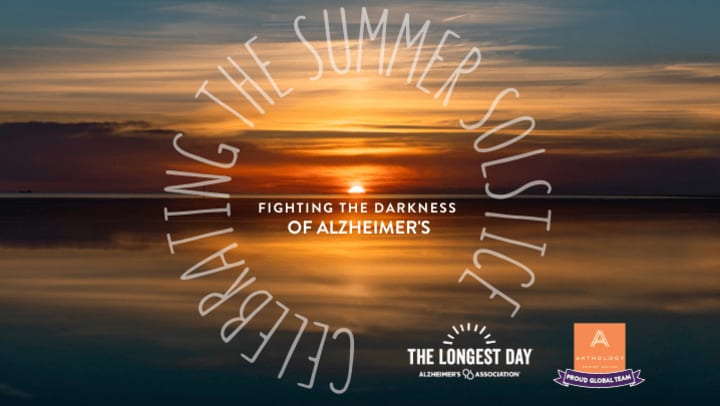A Proud Globe Team for The Longest Day®!
Anthology Senior Living is a proud global team for fundraising for The Longest Day. The expansive team has 38 teams with more than 50 participants! Anthology has already raised over $9,000 for the effort, with an overall goal of $50,000. Today many of our communities nationwide are participating in fun activities, like carnivals and card games which can be enjoyed by the community residents as well as family members or anyone interested. To learn more about how our communities are participating and how much we have raised or to donate, click here. The Longest Day is a cherished tradition for team members and residents alike.
The month of June is also marked as Brain Health and Alzheimer’s Awareness Month, which raises awareness of brain well-being and the disease that more than six million Americans live with daily. Alzheimer’s was listed as the fifth-leading cause of death in 2019 for individuals 65 and older. Gaugler, J., James, B., Johnson, T., Reimer, J., Scales, K., Tom, S., & Weuve, J. (2023). 2023 ALZHEIMER’S DISEASE FACTS AND FIGURES. Chicago, Illinois; Alzheimer’s Association, p. 35, https://www.alz.org/media/Documents/alzheimers-facts-and-figures.pdf.
The Longest Day® was founded by the Alzheimer’s Association. People from around the world come together on the day of the year with the most light to collectively fight the darkness of Alzheimer’s. This is a crucial time to propel Alzheimer’s research by raising money and awareness, but it’s also a time to reflect on what we can do to protect our brain health in our everyday lives.
This devastating disease is the only top 10 cause of death in America that cannot be prevented, cured, or slowed.
What is Alzheimer’s disease?
According to the National Institute on Aging, “Alzheimer’s disease is a brain disorder that slowly destroys memory and thinking skills, and eventually, the ability to carry out the simplest tasks. In most people with Alzheimer’s, symptoms first appear later in life. Estimates vary, but experts suggest that more than 6 million Americans, mostly 65 or older, may have Alzheimer’s.”
Alzheimer’s disease is progressive, and dementia symptoms worsen over time. Beginning with mild memory loss, impairment eventually graduates into losing the ability to respond to environmental stimuli, such as participating in a conversation.
Thousands of people around the world are rallying to raise awareness of Alzheimer’s disease through the observance of The Longest Day, coinciding with the summer solstice on June 21. The Alzheimer’s Association encourages participants to fundraise with the activity of their choice, and you may find that many senior communities are also raising awareness and funds with events, activities and campaigns.
Can Alzheimer’s disease be prevented?
While the disease cannot be prevented, proactive approaches to treatment and management of Alzheimer’s can improve quality of life for both individuals and their caregivers. The greatest risk factors for Alzheimer’s are advanced age, genetics and family history of the disease. Some other risk factors such as isolation; low mental, social or physical activity; smoking; high blood pressure; and diet can contribute to developing Alzheimer’s. These are considered “modifiable” risks, and experts note that addressing these factors may delay up to 40% of dementia cases.(Gaugler, J., James, B., Johnson, T., Reimer, J., Scales, K., Tom, S., & Weuve, J. (2023). 2023 ALZHEIMER’S DISEASE FACTS AND FIGURES. Chicago, Illinois; Alzheimer’s Association, p. 17, https://www.alz.org/media/Documents/alzheimers-facts-and-figures.pdf.)
In the United States, more than 11 million individuals are providing unpaid care for a family member or friend with dementia. This contribution is estimated to be valued at nearly $340 billion (page 42) with an estimated 18 billion hours of time doing these activities. These individuals are referred to as “caregivers,” and their services include assisting with daily living activities such as bathing, dressing, shopping and using transportation.
Many caregivers in these roles experience substantial emotional, financial and physical difficulties when caring for friends or family with dementia. Nearly 60% of family caregivers rate the emotional stress of caregiving as “high or very high” (page 48). The prevalence of depression among dementia caregivers is between 30 and 40 percent, and the prevalence of suicide ideation is more than 30% higher than the national average.
With the baby boomer generation graduating into retirement age, the population of Americans age 65 and older is projected to grow to 88 million by 2050. (page 22) With the risk factor of age in Alzheimer’s patients, Alzheimer’s cases are expected to grow tremendously as well.
As the disease progresses, many families choose to move their loved one into a senior care community like Anthology’s network of nationwide communities. These communities offer specialized training and care, round-the-clock support, and advances in safety and emotional technologies that benefit those with dementia. These processes make the transition to senior living communities easier and helps reduce the burden on friends and family members, with the added peace of mind that your loved one is well cared for.
In Anthology memory care neighborhoods, team members form special, close-knit bonds with each resident with tremendous support, respect and companionship. By learning about the residents’ families, backgrounds, hobbies and values, they can play a key role in helping ensure that your loved one’s life remains vibrant and meaningful.
Another feature of Anthology memory care neighborhoods is that they are designed to evoke feelings of home and nostalgia. Memory displays outside each suite feature personal photos and mementos to provide familiarity. In every aspect of life at an Anthology community, details are cherished. Even the dining experience is designed for familiarity, featuring favorite foods.
Anthology’s wellness programs embody the six dimensions of wellness: physical, social, emotional, intellectual, spiritual and environmental. With extensive daily programming catered to appeal to each resident’s hobbies, flexible schedules and activities are designed to create fulfilling lives and bring peace of mind and purpose.
Specialized caregivers are hired at each community after undergoing rigorous, specialized training in dementia care, plus additional mandatory safety training each year. These caregivers provide seamless care for dementia with a high-tech, high-touch approach, employing the latest in smart technology and comprehensive electronic health records.
Safety and security are paramount in dementia care, and Anthology neighborhoods offer personalized outdoor spaces that empower loved ones to connect with and enjoy nature. Utilizing enhanced security measures, including keypad access and real-time location systems to accommodate the evolving cognitive and physical capabilities of the residents, caregivers encourage independence while ensuring that residents stay safe and secure within the community.
Choosing a memory care provider for your loved one can be an extensive process, but the team at Anthology is here to help. We have locations across the nation, and you can find your closest community here and experience the difference – and peace of mind – that Anthology can provide.
While the cases of Alzheimer’s grow year over year, there is hope! In 2023, The US Food and Drug Administration has approved seven drugs for the treatments of Alzheimer’s disease. Several of these drugs are aimed at improving symptoms, but do not affect the underlying changing brain chemistry. Two other drugs seek to change the underlying biology of the disease to slow cognitive and functional decline.
With the continued commitment of senior living providers, family and direct care caregivers, as well as fundraising efforts like The Longest Day from the Alzheimer’s Association, science continues to embark on new and promising advances for dementia and Alzheimer’s care.
Inspired to help? You can help raise funds and awareness with The Alzheimer’s Association by donating here for The Longest Day.


